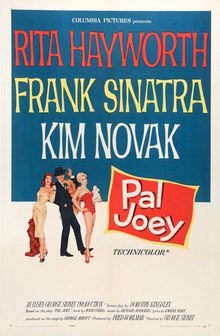Pal Joey (film)
| Pal Joey | |
|---|---|

Theatrical poster
|
|
| Directed by | George Sidney |
| Produced by | Fred Kohlmar |
| Screenplay by | Dorothy Kingsley |
| Based on |
Pal Joey 1940 play Pal Joey 1940 novel by John O'Hara |
| Starring |
Rita Hayworth Frank Sinatra Kim Novak |
| Music by |
Richard Rodgers Lorenz Hart Morris Stoloff (supervision) Nelson Riddle George Duning (arrangements) Arthur Morton (orchestrations) |
| Cinematography | Harold Lipstein |
| Edited by |
Viola Lawrence Jerome Thoms |
| Distributed by | Columbia Pictures |
|
Release date
|
|
|
Running time
|
109 mins. |
| Country | United States |
| Language | English |
| Box office | $4.7 million (US) |
Pal Joey is a 1957 American Technicolor musical film, loosely adapted from the musical play of the same name, and starring Rita Hayworth, Frank Sinatra, and Kim Novak. Jo Ann Greer sang for Hayworth, as she had done previously in Affair in Trinidad and Miss Sadie Thompson. Kim Novak's singing voice was dubbed by Trudy Erwin. George Sidney directed, with the choreography managed by Hermes Pan. Nelson Riddle handled the musical arrangements for the Rodgers and Hart standards "The Lady is a Tramp", "I Didn't Know What Time It Was," "I Could Write a Book" and "There's A Small Hotel."
Sinatra won the Golden Globe Award for Best Actor - Motion Picture Musical or Comedy for his role as the wise-cracking, hard-bitten Joey Evans. Along with its strong box office success, Pal Joey also earned four Academy Award nominations and one Golden Globe nomination.
Pal Joey is one of Sinatra's few post-From Here to Eternity movies in which he did not receive top billing, which surprisingly went to Hayworth. Sinatra was, by that time, a bigger star, and his title role was predominant. When asked about the billing, Sinatra replied, "Ladies first." He was also quoted as saying that, as it was a Columbia film, Hayworth should have top billing because, "For years, she WAS Columbia Pictures", and that with regard to being billed "between" Hayworth and Novak, "That's a sandwich I don't mind being stuck in the middle of." As Columbia’s biggest star, Hayworth had been top billed in every film since Cover Girl in 1944, but her tenure was soon to end, in 1959 with Gary Cooper in They Came to Cordura.
...
Wikipedia
